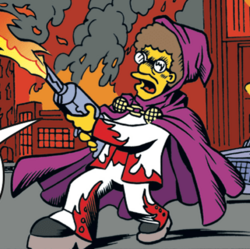
|
The contents of this article or section are considered to be non-canon and therefore may not have actually happened or existed in-universe.
|
- "I'm gonna make the whole city burn, baby, burn!"
- ―Disco Inferno
Disco Inferno
(Disco Stu)
|
Supervillain Information
| Gender:
|
Male ♂
|
| Status:
|
Non-canon fictional
|
| Hair:
|
Brown
|
| Occupation:
|
Supervillain
|
| First appearance:
|
Clip Clip Hooray!
|
|
Disco Inferno was Disco Stu's supervillain alter ego in the comic book Nuclear Power Man and Iron Foot: Heroes for Rent or Lease to Own.
History[edit]
Disco Stu was denied admission to Club 54 in New York City because he wasn't cool enough. Angered, he vowed, "If I can't be cool, we'll all be hot!" He donned a cloak and hood over his disco suit, picked up a flamethrower, assumed his Disco Inferno identity, and set about taking revenge by setting a number of large fires: "I'm gonna make the whole city burn, baby, burn!"
The Battle with Nuclear Power Man and Iron Foot[edit]
Nuclear Power Man and Iron Foot were about to have Christmas dinner when Nuclear Power Man saw the fires from his apartment window. The duo went to investigate, with Iron Foot lagging behind due to his heavy foot. Nuclear Power Man got to the scene first and conferred with the police. He learned that they had sent the Village People to negotiate with Disco Inferno, only for Disco Inferno to forcefully reject their overture and send them, burnt and scorched, back to the police.
Nuclear Power man then went to confront Disco Inferno, again leaving Iron Foot behind as he had just arrived at the police officers' location. Disco Inferno warned him to "Back off or there's gonna be some hot stuff baby this evening!" He then said, "I'm gonna fry you crispier than a disco duck!" and fired a blast from his flamethrower, singeing Nuclear Power Man's hair and turning his Afro into a Flattop. Now enraged, Nuclear Power Man said "I'll kill you!", charged at Disco Inferno and grabbed him by the collar, determined to land a lethal blow.
The fight was interrupted by the sudden appearance of Linus Van Pelt, who told them they had forgotten the true meaning of Christmas. After Linus told them what Christmas was all about, Nuclear Power Man and Disco agreed that Linus was right and decided to stop fighting.
Just then, Iron Foot finally arrived. Not realizing the fight was over, he aimed a kick at Disco Inferno. However, he missed and hit Linus instead, sending him flying through the air. Iron Foot was immediately remorseful, but Disco Inferno was impressed with the strength of his kick. Later, Disco Inferno joined Nuclear Power Man, Iron Foot, the Village People, and a heavily bandaged Linus for Christmas dinner in Nuclear Power Man's apartment. They all raised their glasses in a toast as the story ended.
Behind the Laughter[edit]
- Disco Inferno's name comes from the 1976 disco song "Disco Inferno" by The Trammps.
- Disco Inferno's lines often quote from or refer to 1970s disco songs:
- "Burn, baby, burn" - Features prominently in the refrain of "Disco Inferno".
- "Hot stuff baby this evening" - From the 1979 song "Hot Stuff" by Donna Summer.
- "Crispier than a disco duck" - Refers to the 1976 song "Disco Duck" by Rick Dees.
- Disco Inferno may also be a reference to Flame Thrower, a villain who was defeated by the Human Torch in a Twinkie advertisement which appeared in Marvel Comics in the 1970s.
- Club 54 is a reference to Studio 54.
Appearances[edit]



